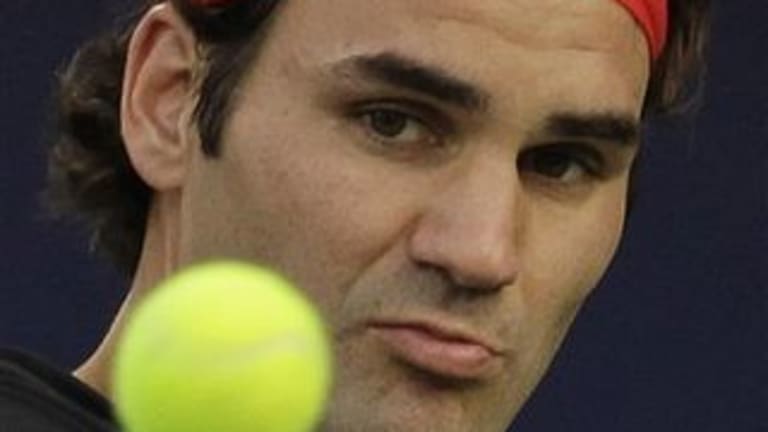Roger Federer demolished Mikhail Youzhny in the quarterfinals of Dubai, 6-3, 6-4. Given that Youzhny never even got to deuce against Federer's serve, we'll need to look at a slightly larger picture to say anything of interest before we get to the gory details.
The great thing about this tournament is that it shows just how much the ATP tour is missing by having all but eliminated fast-court tennis from its schedule. And lest you think I'm just parroting the views of certain disgruntled American players, consider that what got me thinking along these lines this time was the pleasure I took in watching Federer, at work on a court where the rally isn't the end-all and be-all of the game. We're missing out on a lot by not getting to watch this star play more often on fast surfaces, but more on that later in a blog post.
This match in particular underscored two germane, related aspects of fast-court tennis—the fact that the score very often tells you very little about how competitive or one-sided a given match is, and also that if you're playing anyone with a decent hold game, giving up an early break in any given set is tantamount to being shoved in front of a firing squad.
In the first set, Youzhny got his blindfold. In the second, he received his cigarette. Bang!
Youzhny had trouble finding his range early in the match, and Federer quickly broke and jumped out to a 4-1 lead. Tactics-wise, he effectively took time away from Youzhny—and when was the last time you heard of that considerable and often lethal ability playing a role in a match? Granted, Youzhny spends a lot of time fighing his own game, in that he hits a clean, relatively flat ball and is not shy about going for the placement, yet he takes great, big cuts and plays from far enough back to blunt the edge on some of his skills.
Federer, by contrast, likes to belt those groundies as well, but he can do it from further inside the court, and with a much quicker and more fluid and compact swing. And unlike Youzhny, Federer has a very deep natural affinity and affection for the slice. Those inclinations paid great dividends in this match, as did Federer's prowess as a serve-holder.
One aspect of this match illustrated the latter idea beautifully. Federer's first-serve conversion percentage of 54 was mediocre at best (Youzhny was better, at 59 percent), but he dominated the match and was never in danger of being broken. That's because he won 80 percent of his second serve points, which was 11 percentage points higher than his success rate on first serves. Federer's second serve is excellent, but the court speed sure helped him hit those numbers.
Federer threatened to break Youzhny for the second time in the first set, for the set, with the Russian serving at 2-5. But Youzhny fought off two break points (a service winner and backhand error by Federer) and ultimately held with an ace. Although he dodged that bullet, it yielded no momentum, mainly because Federer would not allow it. An ace and two service winners helped Switzerland's finest serve it out at 15.
Federer broke Youzhny in the very next game, the first of the second set. Although that had to be dispiriting, it was a pretty good example of the kind of thing we often see from players, like Youzhny, who are slightly less than A-plus competitors. They go down a break and it somehow relaxes them and enables them to play some of their best tennis, partly because there's no real pressure on them to hold a lead. All the pressure is on the other guy, and while that will eventually get to some players, Federer isn't among that number. He likes playing from in front. He likes to dictate. And no court allows him to dictate as impressively and confidently as a fast hard court.
Still, even on the fastest of courts (certainly by today's absurd standard) a set is rarely decided or rendered pro forma by a single game or break. Serving at 1-3, Youzhny appeared on the verge of being broken again when he fell behind 15-40. But he burst to life, swept away three virtual match points, and held with an ace and forehand error by Federer. Youzhny sprinted to his chair, and you had to wonder, given how quickly things can change on fast courts: Can he turn this thing around?
Federer served up the answer. He lost just three points on serve as he cruised to a 5-4, 40-0, triple-match point lead. Predictably, Youzhny played electric tennis to sweep away two of them, and just as typically he lost the match on the third, with a backhand service return error.
—Pete Bodo
